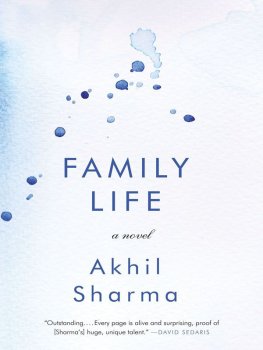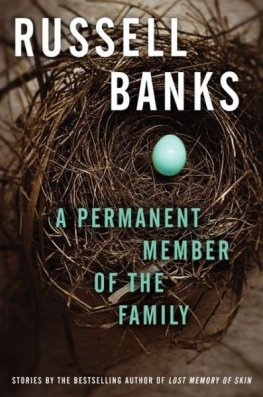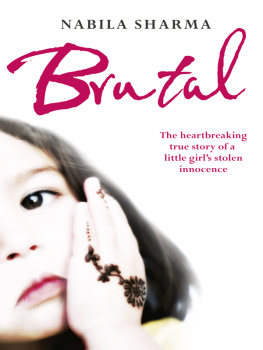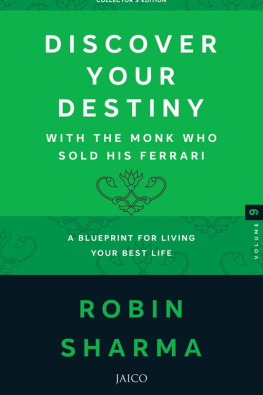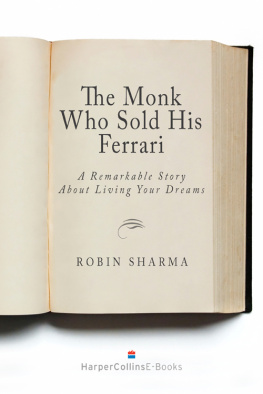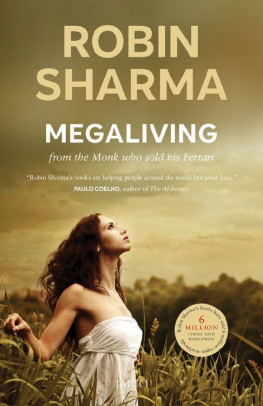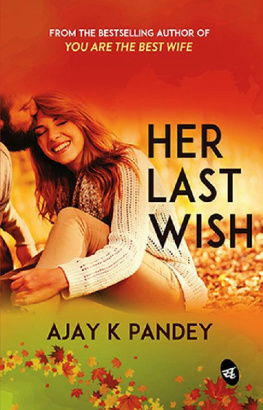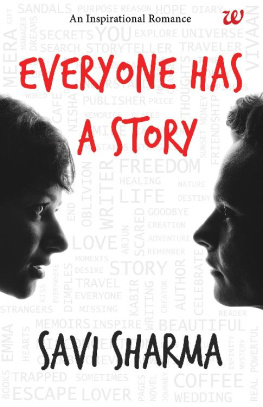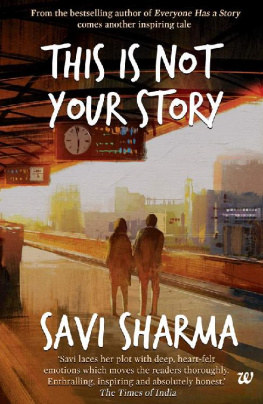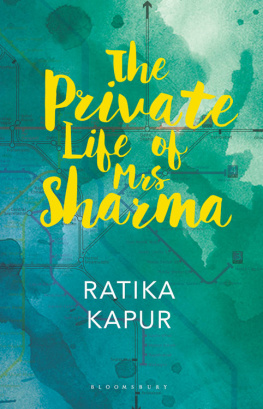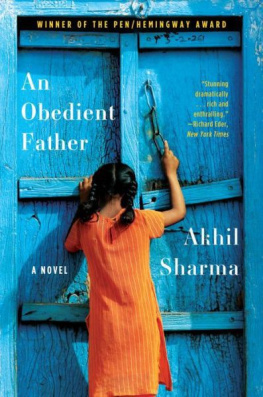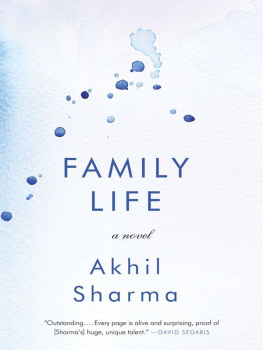This book is dedicated to my beloved wife Lisa Swanson; my poor brother Anup Sharma; and my brave and faithful parents Pritam and Jai Narayan Sharma
My father has a glum nature. He retired three years ago, and he doesnt talk much. Left to himself, he can remain silent for days. When this happens, he begins brooding, he begins thinking strange thoughts. Recently he told me that I was selfish, that I had always been selfish, that when I was a baby I would start to cry as soon as he turned on the TV. I am forty and he is seventy-two. When he said this, I began tickling him. I was in my parents house in New Jersey, on a sofa in their living room. Whos the sad baby? I said. Whos the baby that cries all the time?
Get away, he squeaked, as he fell back and tried to wriggle away. Stop being a joker. Im not kidding. My father is a sort of golden color. Skin hangs loosely from beneath his chin. He has long thin earlobes the way some old people have.
My mother is more cheerful than my father. Be like me, she often tells him. See how many friends I have? Look how Im always smiling. But my mother gets unhappy too, and when she does, she sighs and says, Im bored. What is this life we lead? Where is Ajay? What was the point of having raised him?
AS FAR BACK as I can remember my parents have bothered each other.
In India we lived in two cement rooms on the roof of a two story house in Delhi. The bathroom stood separate from the living quarters. It had a sink attached to the outside of one of the walls. Each night my father would stand before the sink, the sky full of stars, and brush his teeth till his gums bled. Then, he would spit the blood into the sink and turn to my mother and say, Death, Shuba, death. No matter what we do, we will all die.
Yes, yes, beat drums, my mother said once. Tell the newspapers, too. Make sure everyone knows this thing you have discovered. Like many people of her generation, those born before Independence, my mother viewed gloom as unpatriotic. To complain was to show that one was not willing to accept difficulties; that one was not willing to do the hard work that was needed to build the country.
My father is two years older than my mother. Unlike her, he saw dishonesty and selfishness everywhere. Not only did he see these things but he believed that everybody else did, too, and that they were deliberately not acknowledging what they saw.
My mothers irritation at his spitting blood, he interpreted as hypocrisy.
MY FATHER WAS an accountant. He went to the American consulate and stood in the line that circled around the courtyard. He submitted his paperwork for a visa.
My father had wanted to emigrate to the West ever since he was in his early twenties, ever since America liberalized its immigration policies in 1965. His wish was born out of self-loathing. Often when he walked down a street in India, he would feel that the buildings he passed were indifferent to him, that he mattered so little to them that he might as well not have been born. Because he attributed this feeling to his circumstances and not to the fact that he was the sort of person who sensed buildings having opinions of him, he believed that if he were somewhere else, especially somewhere where he earned in dollars and so was rich, he would be a different person and not feel the way he did.
Another reason he wanted to emigrate was that he saw the West as glamorous with the excitement of science. In India in the fifties, sixties, and seventies, science felt very much like magic. I remember that when we turned on the radio, first the voices would sound far away and then they would rush at us, and this created the sense of the machine making some special effort just for us.
Of everybody in my family, my father loved science the most. The way he tried to bring it into his life was by going to medical clinics and having his urine tested. Of course, hypochondria had something to do with this; my father felt that there was something wrong with him and perhaps this was a simple thing that a doctor could fix. Also, when he sat in the clinics and talked to doctors in lab coats, he felt that he was close to important things, that what the doctors were doing was the same as what doctors would do in England or Germany or America, and so he was already there in those foreign countries.
To understand the glamour of science, it is important to remember that the sixties and seventies were the era of the Green Revolution. Science seemed the most important thing in the world. Even I, as a child of five or six, knew that because of the Green Revolution there was now fodder in the summer and so people who would have died were now saved. The Green Revolution was effecting everything. I heard my mother discuss soy recipes with neighbors and talk about how soy was as good as cheese. All over Delhi, Mother Dairy was putting up its cement kiosks with the blue drop on the side. That the Green Revolution had come from the West, that organizations like the Ford Foundation had brought it to us without expectations of gain or payment, made the West seem a place for great goodness. I personally think that all the anti-Western movies of the seventies like Har Rama, Har Krishna and Purab aur Pachhim sprang not from the unease of hippies arriving but from our sense of inferiority before the munificence of the West.
My mother had no interest in emigrating for herself. She was a high school teacher of economics, and she liked her job. She said that teaching was the best job possible, that one received respect and one learned things as well as taught them. Yet my mother was aware that the West would provide me and my brother with opportunities. Then came the Emergency. After Indira Gandhi suspended the constitution and put thousands of people in jail, my parents, like nearly everyone, lost faith in the government. Before then, my parents, even my father, were proud enough of India being independent that when they saw a cloud, they would think, Thats an Indian cloud. After the Emergency, they began to feel that even though they were ordinary and not likely to get into trouble with the government, it might still be better to leave.
In 1978, my father left for America.
IN AMERICA, MY father began working as a clerk for a government agency. He rented an apartment in a place called Queens, New York. A year after he left us, he sent airplane tickets.
The Delhi of the seventies is hard to imagine: the quietness, the streets empty of traffic, children playing cricket in the middle of the street and rarely having to move out of the way to let cars by, the vegetable vendors who came pushing their carts down the street in the late afternoon, crying out their wares in tight, high-pitched voices. There werent VCRs back then, let alone cable channels. A movie would play for twenty-five or fifty weeks in huge auditorium theaters, and then once the movie was gone, it was gone forever. I remember feeling grief when the enormous billboards for Sholay at the end of our street were taken down. It was like somebody had died.
It is also hard to remember how frugal we were. We saved the cotton that comes inside pill bottles. Our mothers used it to make wicks. This frugality meant that we were sensitive to the physical reality of our world in a way most people no longer are. When my mother bought a box of matches, she had my brother sit at a table and use a razor to split the matches in half. When we had to light several things, we would use the match to set a twist of paper on fire and then walk around the apartment lighting the stove, the incense stick, the mosquito coil. This close engagement with things meant that we were conscious that the wood of a match is soft, that a bit of spit on paper slows down how it burns.

